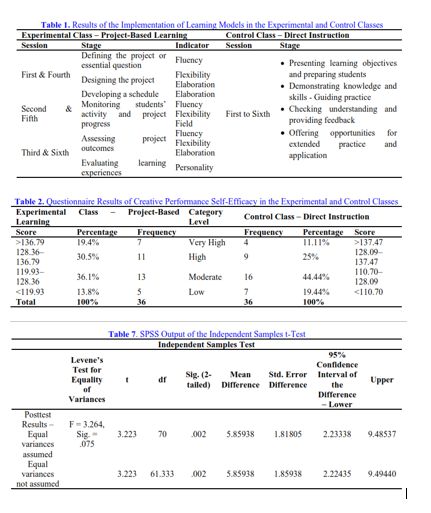The Impact of Project-Based Learning on Students’ Creative Self-Efficacy in Statistics Learning
https://doi.org/10.51574/kognitif.v5i3.2490
Keywords:
Creative Self-Efficacy , Direct Instruction , Experimental Class , Control Class , Project-Based LearningAbstract
Statistics learning at the junior high school level still faces challenges in developing students’ creative thinking skills. Students often struggle to understand fundamental statistical concepts due to conventional instructional practices that provide limited opportunities for in-depth data exploration. This study aims to analyze the effect of implementing the Project-Based Learning model on the Creative Self-Efficacy of eighth-grade students at SMPN 11 Jambi City in the topic of statistics. Employing a quantitative approach, this research utilized a true experimental method with a posttest-only control group design. This design was selected to avoid testing effects and to focus on the final learning outcomes. The study involved two sample classes: an experimental class that applied Project-Based Learning and a control class that received Direct Instruction. Research instruments included an observation sheet to measure the implementation of the learning model and a Likert-scale Creative Self-Efficacy questionnaire to assess the dependent variable. Data were analyzed using the Kolmogorov-Smirnov normality test, Levene’s homogeneity test, and an independent sample t-test. The results revealed a significant effect of Project-Based Learning on students’ Creative Self-Efficacy, with a significance value of 0.002 < 0.05. Furthermore, the experimental class achieved a higher mean posttest score (81.03) compared to the control class (75.17). These findings contribute to the development of instructional strategies that foster students’ creative self-confidence through authentic and meaningful project-based learning experiences.
Downloads
References
Abbott, D. H. (2010). Constructing a Creative Self-Efficacy Iventory: A Mixed Methods Inquiry.
Alhazizah, F., Jalmo, T., & Yolida, B. (2019). Pengaruh Project Based Learning Terhadap Self-Efficact dan Keterampilan Berpikir Kreatif. Jurnal Bioterdidik S6, 7(4), 10–21. https://doi.org/10.23960/jbt.v7i4.2372
Bandura, A. (1997). Self-efficacy: The exercise of control. W.H. Freeman and Company. https://www.academia.edu/28274869
Batanero, C., & Díaz, C. (2010). Training Teachers to Teach Statistics: What Can We Learn From Research?. Statistique et Enseignement, 1(1), 5-20. https://statistique-et-enseignement.fr/index.php/StatEns/article/view/3
Ellala, Z. K., Abu-Attiyeh, J. H., Kaba, A., & Jabarah, T. A. (2023). Creative Self-Efficacy: a Comparative Study of Outstanding and Ordinary Students in the United Arab Emirates. Creativity Studies, 16(2), 593–603. https://doi.org/10.3846/cs.2023.17013.
Filcik, A., Bosch, K., Pederson, S., & Haugen, N. (2012). The Effects of Project-Based Learning (PBL) Approach on The Achievement and Efficacy of High School Mathematics Students: A longitudinal Study Investigating The Effects of The PBL Approach in Mathematics Education. In Proceeding of The National Conference On Undergraduate Research (NCUR), 29–31. https://core.ac.uk/download/pdf/357369954.pdf
Garfield, J., Ben-Zvi, D., Chance B., & Medina, E. (2008). Developing Students' Statistical Reasoning: Connecting Research and Teaching Practice. Springer Science & Business Media. http://dx.doi.org/10.1007/978-1-4020-8383-9
Haryono, Y. W. (2016). Berpikir Kreatif Matematis Pada Model Quantum Learning dengan Asesmen Otentik Ditinjau dari Self-Efficacy Siswa SMP. Prosiding Seminar Nasional Matematika, 79–88. https://doi.org/10.24127/semnas.v0i0.761
Levinta, A., Gunowibowo, P., & Sutiarso, S. (2024). Pengaruh Self-Efficacy Terhadap Kemampuan Berpikir Kreatif Matematis Siswa dalam Pembelajaran Saintifik. Jurnal Inovasi Pendidikan Matematika, 6(2), 232–244. https://doi.org/10.31851/indiktika.v6i2.15114
Ningsih, S. R., Disman, Ahman, E., Suwatno, & Riswanto, A. (2020). Effectiveness of using the project-based learning model in improving creative-thinking ability. Universal Journal of Educational Research, 8(4), 1628–1635. https://doi.org/10.13189/ujer.2020.080456.
Saepuloh, D., & Suryani, S. (2020). Improving Students Creative Thinking and Self Efficacy Through Project-based Learning Models. Economica: Journal of Economic and Economic Education, 9(1), 42–52. http://dx.doi.org/10.22202/economica.2020.v9.i1.4250
Siregar, Y. A., & Sukatno. (2017). Hubungan Self-Efficacy dan Sikap Positif terhadap Prestasi Akademik Siswa SMK Negeri 1 Sipirok. MES: Journal of Mayhematics Education and Science, 3(1), 22-29. http://dx.doi.org/10.36058/mes.v3i1.22
Sugiyono. (2016). Metode Penelitian Kuantitatif Kualitatif dan R&D. CV Alfabeta.
Syarifah, L., Holisin, I., & Shoffa, S. (2021). Meta Analisis: Model Pembelajaran Project Based Learning. Jurnal Penelitian Pembelajaran Matematika, 14(2), 256–272. https://dx.doi.org/10.30870/jppm.v14i2.11905
Rachmantika, A. R., & Wardono. (2019). Peran Kemampuan Berpikir Kritis Siswa Pada Pembelajaran Matematika Dengan Pemecahan Masalah. Prosiding Seminar Nasional Matematika, 2(1), 439-443. https://journal.unnes.ac.id/sju/index.php/prisma/
Watson, J. M. (2006). Statistical literacy at school: Growth and goals. Lawrence Erlbaum Associates.
Yaniawati, P., Kariadinata, R., Sari, N. M., Pramiarsih, E. E., & Mariani, M. (2020). Integration of e-Learning for Mathematics on Resource- Based Learning: Increasing Mathematical Creative Thinking and Self-Confidence. International Journal of Emerging Technologies in Learning (IJET), 15(06), 60–78. https://doi.org/10.3991/ijet.v15i06.11915.

Downloads
Published
How to Cite
Issue
Section
License
Copyright (c) 2025 Suci Tiara Novianti, Sri Winarni, Marlina

This work is licensed under a Creative Commons Attribution-ShareAlike 4.0 International License.
Education and Talent Development Center of Indonesia (ETDC Indonesia)
e-mail: kognitif@gmail.com, website : https://etdc-indonesia.com

Kognitif: Jurnal Riset HOTS Pendidikan Matematika dengan Situs: https://etdci.org/journal/kognitif berlisensi Creative Commons Attribution-ShareAlike 4.0 International License









.png)

